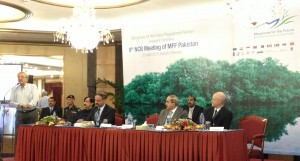Local Organisations Strengthened with Grants Worth 310,000 US $ in Pakistan
Friday, April 26th, 2013 3:08:51 by News Pakistan Admin
Karachi, April 26th, 2013– At the 9th Inaugural NCB meeting of the Mangroves for the Future Programme, leading regional and local coastal experts are emphasizing how empowering local organisations and the communities is imperative for a healthy ecosystem. As a developing nation, we have a stake in protecting coastal areas as essential sources of food, oil and gas reserves, naval trade, and carbon storage, and that is only possible, if local wisdom is harnessed with technical expertise and supplemented with better funding opportunities.
Mangroves for the Future Programme, a regional initiative, which came about after the 2004 Tsunami, left many countries vulnerable to the rapid depletion of coastal resources. It initially focused on the countries worst affected by the tsunami i.e., India, Indonesia, Maldives, Seychelles, Sri Lanka, and Thailand but has recently expanded to include Pakistan, Bangladesh and Viet Nam.
Pakistan’s latest brush with severe climatic changes, has forced the experts and the government to rethink and realign its strategy along the lines of nature-based-solutions, using “ridge to reef” management approach that MFF brings to the rehabilitation and stewardship of coastal resources.
“The costs of dealing with climate triggered impacts is going up and, according to assessments could be in the range of US 6 to 14 billion per year for Pakistan. Already climate triggered natural disasters have cost Pakistan’s economy 10 billion$ in 2010, making Pakistan, one of the severely hit countries in the world”, says Mahmood Akhtar Cheema, Country Representative, IUCN Pakistan.
MFF activities in Pakistan are being implemented through small and medium grant projects, which is unique in a way because it is open to a vast segment including, governmental organisations, civil society, media and the academia, who are interested in implementing projects along coast of Pakistan. Though MFF uses mangroves as a flagship ecosystem in recognition of the destruction caused to mangroves by the tsunami, however, MFF is inclusive of all coastal ecosystems, including coral reefs, estuaries, lagoons, sandy beaches, sea grasses and wetlands.
“The mission of MFF is to promote healthy coastal ecosystems through a partnership-based, people-focused, policy-relevant and investment-orientated approach, which builds and applies knowledge, empowers communities and other stakeholders, enhances governance, secures livelihoods, and increases resilience to natural hazards and climate change”, says Steen Christensen, MFF Coordinator.
The first cycle of MFF Small Grants was implemented during 2011-12 under which nine small grant projects worth US$63000 related to conservation of mangroves and awareness were implemented by different government and non-governmental organisations. These small grants have addressed several themes pertaining to coastal areas, including participatory conservation of mangroves, advocacy and awareness on mangroves and other coastal resources to highlight their roles in disaster risks reduction, livelihoods and environmental management.
Under the currently underway, second and third cycle, eleven small grants worth US$110,000 are being awarded to government and civil society organisations in Sindh and Balochistan provinces for implementation of various small grant projects, whereas, US$ 200,000 are being awarded to three government and non-government organisations for implementation of medium grant projects, including WWF Pakistan, Pakistan Navy and Sindh Livestock & Fisheries Department. These grants are awarded by the National Coordinating Body of MFF through open calls, using a transparent scrutiny process.
If managed well, Mangrove ecosystem is considered to have highest capacity to storehouse of carbon emissions, which is an important contributor to the build-up of greenhouse gases in atmosphere and climate change.
“Ministry of Climate Change is working with the provincial governments to implement REDD+ in Pakistan which provides tools and opportunities for carbon trading and earning foreign exchange”, says Syed Muhammad Ali Gardezi, Secretary, Ministry of Climate Change/ Chair, NCB, MFF Pakistan.
Coupled with the small yet significant efforts of the successful small and medium grantees of MFF, the government has also stepped in to initiate a large-scale mangrove restoration programme in the Indus Delta, where 100,000 hectares have been earmarked for new plantations in collaboration with IUCN Pakistan.
“The future lies in partnerships at the local level coupled with regional expertise. I believe the Regional initiatives like MFF is a step in the right direction since it is a Programme that has played the role of a catalyst in promoting regional approach for solutions to many of our common environmental and socio-economic problems”, says Justice (retd) Zahid Kurban Alavi, Chief Minister Sindh, Chief Guest at the inaugural.
Besides the small and medium grants, MFF is also involved in two regional initiatives funded by UNEP and FAO, which are in process of inception during 2013. These initiatives will focus on addressing issues of coastal erosion and creating financial incentives for the local communities for sustainable management of the coastal resources.
Under the capacity building initiatives of MFF, more than 150 participants from government, civil society and community-based organisations have been trained locally and internationally in project cycle management, integrated coastal resources management and experience sharing, helping them to deal effectively with sustainability challenges in coastal areas, especially as risks are exacerbated by the impacts of climate change.
Mangroves For The Future Initiative
Mangroves for the Future (MFF) is a unique partner-led initiative to promote investment in coastal ecosystem conservation. In December 2006 President Bill Clinton planted the first mangrove tree to launch the MFF initiative at a fishing village on Phuket Island, Thailand. At the launch of the Tsunami Legacy Report (2009) in the United Nations in New York In April 2009, Bill Clinton said that MFF has been one of the most positive and forward-looking developments since the tsunami. MFF provides a collaborative platform among the many different agencies, sectors and countries who are addressing challenges to coastal ecosystem and livelihood issues, to work towards a common goal. It initially focused on the countries worst-affected by the tsunami; India, Indonesia, Maldives, Seychelles, Sri Lanka, and Thailand. MFF member countries now include Pakistan and Viet Nam.
Short URL: https://www.newspakistan.pk/?p=40018

















